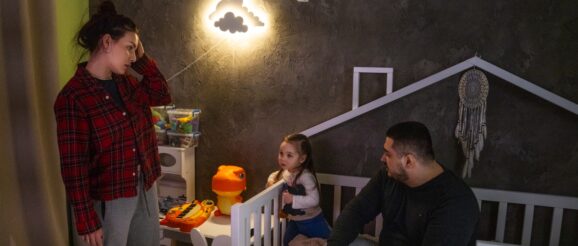Ukrainians face fears during the country’s darkest nights

KHARKIV, Ukraine — Arkadii Rubin no longer tells his wife when there is an air raid siren at night. “Why would I wake her up? She has to sleep.”
Hanna Rubin, his wife, decided to take the air raid alert app off her phone last year. She doesn’t want to know anymore if there are incoming threats to their home in Kharkiv. She’d rather try and sleep.
At this point in the war, the need for sleep has overcome the fear of night, says psychologist Yuliia Krat who works with East SOS, a noofit that assists people affected by the war. She sees patients with sleep issues all the time these days.
It “disturbs all Ukrainians now,” she says. “No matter if they’ve been evacuated or [internally displaced]. Or they are just locals in Dnipro … People are coming with sleep disturbances or depression.”

But Ukrainians don’t always have the option to avoid distractions. Russian attacks often come at night — drones, missiles, artillery. In many instances over more than three years of war, people have been asleep, or trying to sleep, in their homes when acts of war shattered the night.
Hanna, Arkadii and their two-year-old daughter Leya were woken before 7 a.m. in January 2024 by a strike in their neighborhood. Minutes later, another strike hit the building next door. The shockwaves and shrapnel shattered glass into their own apartment, slicing Arkadii’s arms and back.
In the nights immediately after the attack, “We couldn’t sleep at all. Sleeping for like 10 minutes at a time. After the hit initially, for the first three days, we hadn’t slept at all,” says Hanna.
Desperate for a proper rest, they left their home in Kharkiv and drove a few hours further away from the front lines to stay in a hotel in the woods of Poltava. They still do that every few months, when the fear and exhaustion of living in Kharkiv overwhelms them. Just to sleep.

Sleeping out of exhaustion, however, is not the same as sleeping free from war.
“If before war we had what can be called full sleep, now it’s necessary sleep. Our brain takes as much as it needs to keep being alive,” says Krat.
That’s how Volodymyr Lohinov says he sleeps most of the time when he’s on shift as a firefighter, grabbing bits of sleep as necessary. During the war, it’s gotten even worse.
“We had three and four nights with no sleep at all,” Lohinov recalls about the time when the war started with Russia’s full-scale invasion in February 2022. “You have a spare moment, you found a place, you sleep. That’s it.”

He says his firefighting crew has noticed different patterns about the attacks. “It varied a lot. We had a time when they had an exact schedule of their attacks. We knew for example that it’s 11 p.m. now, and we are going to have ballistics [missiles] like S-300 [surface-to-air missiles] coming toward us now. Then they shifted to 1 a.m. Then at 3 a.m. After that, we were hit at 5 a.m.”
But no matter the exact timing, many people find that war has turned a time that should be restful into one filled with anxiety.
Lohinov’s father, Vladyslav Lohinov was killed during a nighttime attack last year. Also a firefighter, he was killed while on duty. It was on a night in April when father and son were both out on calls responding to strikes in the city, not far from each other.

Hanna and Arkadii Rubin don’t tell Leya about air raid alerts. They want to shield her as much as possible from the stress of these nighttime attacks and the trauma of the war. They tell her the sounds of war are actually thunderstorms or delivery trucks unloading.
“She doesn’t need to know how cruel this world is at all, at least as long she doesn’t fully understand it,” says Arkadii.
They’re playing make-believe, but it’s also true that actual delivery trucks are no longer on the streets of Kharkiv at night. Lately, the city is quiet after dark — more so than before the war. Most people are at home. The police enforce a curfew at 11 p.m., so streetlights are turned out and the streets are cleared of civilians, with few exceptions.
Darkness has spread indoors too, as power cuts grew common over the war, particularly in winter. People have had to make do with flashlights, candles, and occasionally generators as Ukraine rationed energy.

But even with this quiet and darkness at night, healing from this nighttime trauma takes time, says Krat. One of the big challenges she sees with people who come to her with problems sleeping is to accept the silence — and not equate it with the anticipation of something dangerous.
“They need time to get used to the fact that it can be quiet. And quiet doesn’t mean that something is about to explode,” she says. “It means that they can sleep now.”

